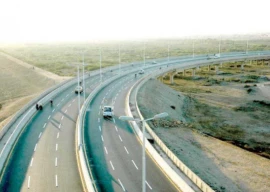
To explain the connection between language and civilisation, Prof. Dr Arfa Sayeda Zehra - educationist, teacher and scholar - spoke to a packed audience at Aga Khan University (AKU) Auditorium at on Tuesday evening.
According to Dr Zehra, civilisation and language have a handy relationship. Civilisation dies unless it has a good language for its propagation and outreach but since the civilisation is based on morality, its means of expression should be moral as well.
With her customary eloquence, Dr Zehra kept the audience engaged throughout the lecture. The hall gave a standing ovation to her when she stepped on the podium after AKU finance senior manager Hassan Somani narrated a few sentences from one of her speeches as he invited her on stage.
The soft-spoken professor instantly grabbed everyone’s attention as she began her speech on ‘Hota Hai Shabo Roz Tamasha Meray Aagay’. “Maulanas may get annoyed when I say that the blood in my veins starts dancing when I see the youth connected and associated with life,” she said. “Life should, however, keep dancing whether someone considers ‘dancing’ legitimate or not. When the pulse has no beat, and the blood in your veins doesn’t dance, that’s called death.”
For Dr Zehra, civilisation is not something that can be sensed, smelled or wrapped. Rather, it is something to be understood and believed, she explained. “Civilisation needs a language and unless it gets a language that can carry its intent, text and experience to people, they will not be informed of that civilisation,” she said.

Through the use of cellphones, we are damaging the English language by introducing new types short words in text messages, she pointed out. She also clarified that sticking to the past is not life and civilisation is not what has happened and is written in books. Civilisation and language should keep on changing but there is difference between change and distortion. “Things should keep on changing but not get distorted.” For instance, morals should not change. They should remain the same in 2013 as they were in 1813 or 1913, she said.
Urdu and diversity
On the birth of the Urdu language, Dr Zehra recalled how people of different cultures joined their languages for a dialect that was understandable to all. “They gave birth to a very diversified and colourful civilisation, which was not of any single man or tribe or class.” She regretted that today a man cannot even pray inside someone else’s mosque. “We look for points of opposition and not points of unity.”
She gave the example of Persian poet Ameer Khusru - the first man to write the first line of his poetry in Urdu and the second in Persian. “This was an experience of civilisation, which says that half of the words will be understandable to you and other half to me and thus the conversation will be complete.”
During the question-answer session, Dr Zehra criticised the Islamisation of text books. “We have put Islamiyat in all textbooks - even English has been made Muslim.” When she was examining the textbooks of all provinces during General Zia’s regime, Dr Zehra recalled a woman telling her that they have altered science according to Islam. “One of those science books read: ‘Inshallah when oxygen combines with hydrogen, then Mashallah water is produced’.” She concluded her speech with yet another standing ovation.
Published in The Express Tribune, May 23rd, 2013.
COMMENTS (1)
Comments are moderated and generally will be posted if they are on-topic and not abusive.
For more information, please see our Comments FAQ

















I believe language to be the primary indicator of one's demographic association - ethnicity in other words. Cultures thrive on the basis of identification with language (among other factors), but language is the key determinant. This is a sociological perspective on this issue. It is unfortunate that we have not only managed to twist around the meaning of words in Urdu, but also started to misuse English.
I concur with the text message part - during all my years in the US and the Canada I hardly came across a single text message where an unorthodox abbreviation was used.
And this is only the tip of the iceberg. For example, in today's context, I have come across messages and even heard it on media that Fakhruddin G. Ibrahim was shortened to Fakhru bhai. Ridiculous. At least give respect to names.